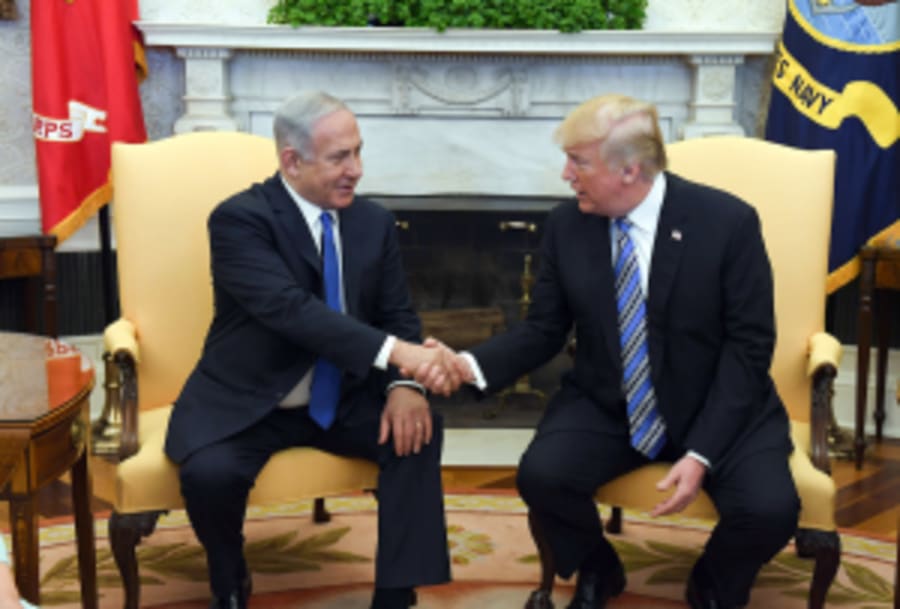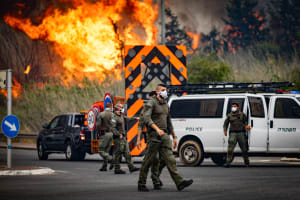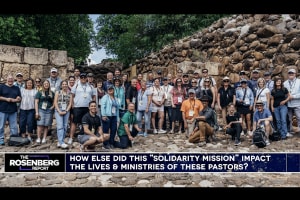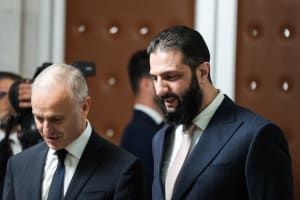Huckabee takes ALL ISRAEL NEWS ‘inside the room’ as Netanyahu met with 14 Evangelical leaders before Trump meeting
What was said? Who was there?

WASHINGTON – Before his historic meetings with President Donald J. Trump, Israeli Prime Minister Benjamin Netanyahu met with fourteen American Evangelical leaders on Monday to share his perspective on the enormous challenges facing Israel in 2025 and to answer their questions.
This morning, I spoke by phone with Ambassador-designate to Israel, Mike Huckabee, about why he organized the 90-minute intimate gathering at the Blair House, the official guest quarters next to the White House used by visiting heads of state.
Huckabee graciously took ALL ISRAEL NEWS inside the room, as it were, to understand some of the questions that were asked, some of what Netanyahu shared, and some of his own personal takeaways.
Among those Evangelicals attending the meeting were:
• Franklin Graham, president of Samaritan’s Purse
• Tony Perkins, president of the Family Research Council
• Robert Jeffress, senior pastor at Dallas First Baptist
• Jim Garlow, former senior pastor in San Diego
• Ralph Reed, founder & chairman of the Faith & Freedom Coalition
• Mario Bramnick, president of the Latino Coalition for Israel
• John Hagee, founder and chairman of Christians United for Israel
• Jentezen Franklin, senior pastor of Free Chapel in Georgia
• Pastor Michael Youssef, founder of Leading The Way
• Matt Staver, founder and chairman of Liberty Counsel
• Mike Evans, founder of the Jerusalem Prayer Team
• Paula White, director of White House Faith Initiative Office
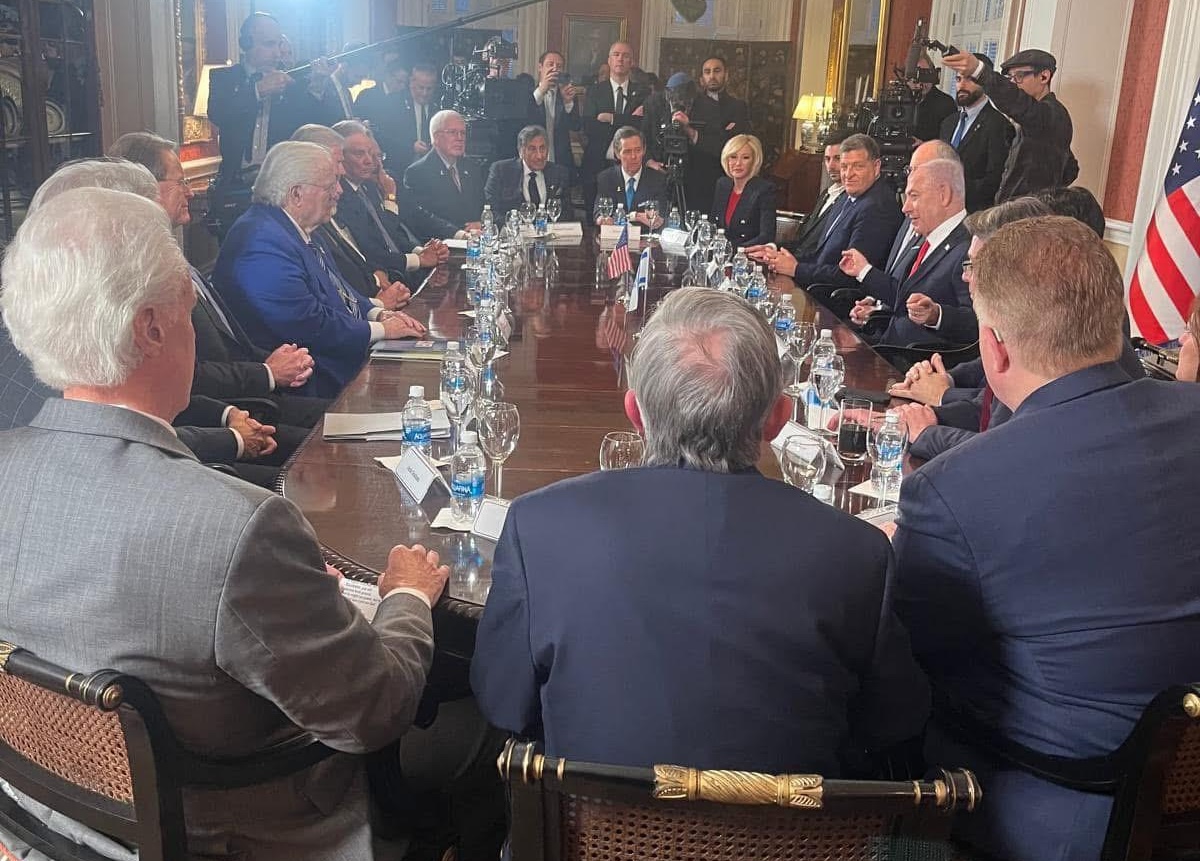
The following is a transcript of my conversation with Amb. Huckabee, lightly edited for clarity.
Rosenberg: Ambassador-designate Mike Huckabee, first of all, congratulations. We're praying that your Senate confirmation hearings go well. I'm guessing you weren't thinking that right in the middle of that very intense process, you would also be receiving the Prime Minister of Israel for the first meeting with the President. And then also just to have you organizing a small intimate gathering of Evangelical leaders to meet with Prime Minister Netanyahu prior to the meeting with President Trump. Would you just talk a little bit about what that was, give us a little flavor of what that meeting was, why you did it, and how we can be praying for this relationship between Trump, Netanyahu, the U.S., and Israel.
Ambassador Mike Huckabee: Joel, as you know, there's no greater supporter of the state of Israel and the Jewish people than the American Evangelicals. And sometimes, the prime minister and I think the larger population of Israel needs to know who their friends are.
It seemed to be an important moment to be able to affirm to the Prime Minister that there is a group of Bible-believing people in the United States that stand with the State of Israel, but also with the Jewish people at a very important time, when anti-Semitism is at an epidemic tide, and when there are so many threats to the existential nature of the state of Israel.
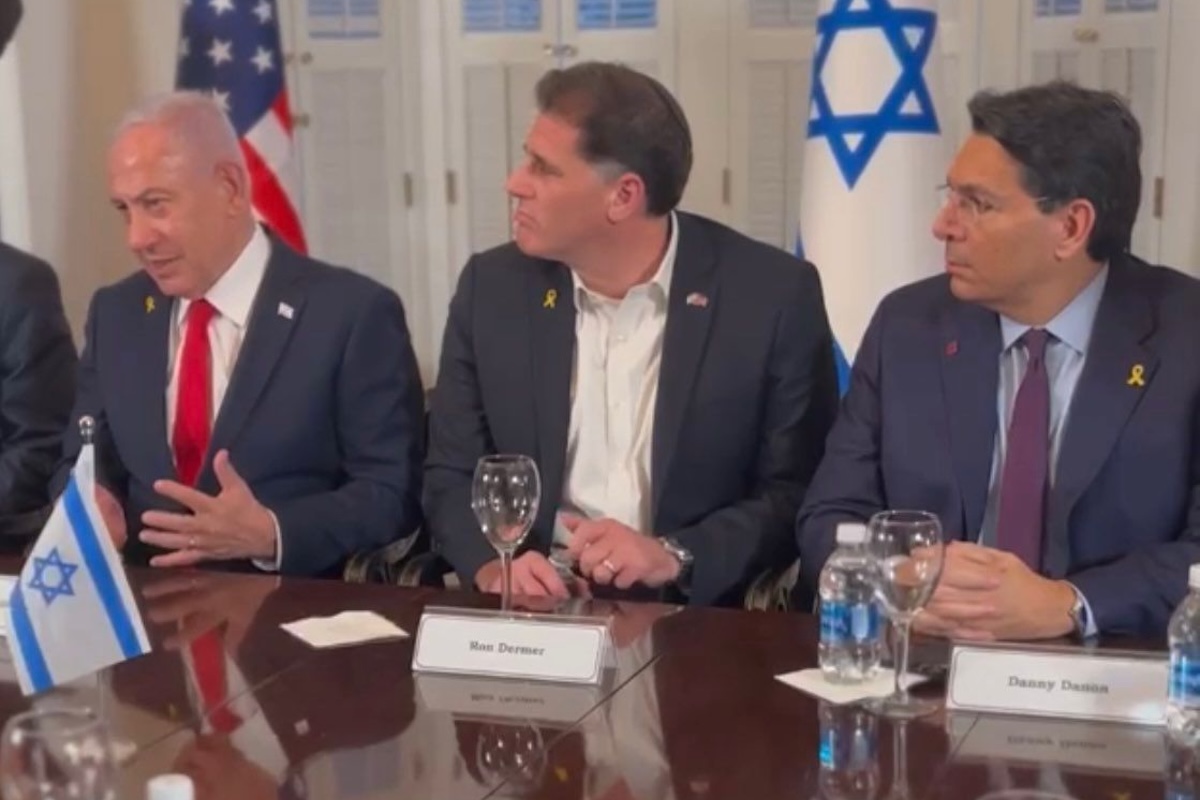
So, this was just a small sampling in order to have an intimate conversation with the Prime Minister. It would have been so easy to have gotten a large crowd because there are so many people who represent leadership positions in Evangelical groups or organizations across the country. It was done mainly to have sort of a thoughtful conversation with the prime minister, with the hope that not just he would share with us, but that we could ask questions in a setting that would be cordial, and give him the ability to be candid and really straightforward with us. The questions were thoughtful and penetrating, and his answers reflected a real seriousness in that setting.
I think he came away encouraged. He came away with that sense that he really does have friends. It's not a personal thing. I think it's not just for Bibi Netanyahu, it's for the leadership of the state of Israel and the Jewish people, and that was something that I thought was important to convey.
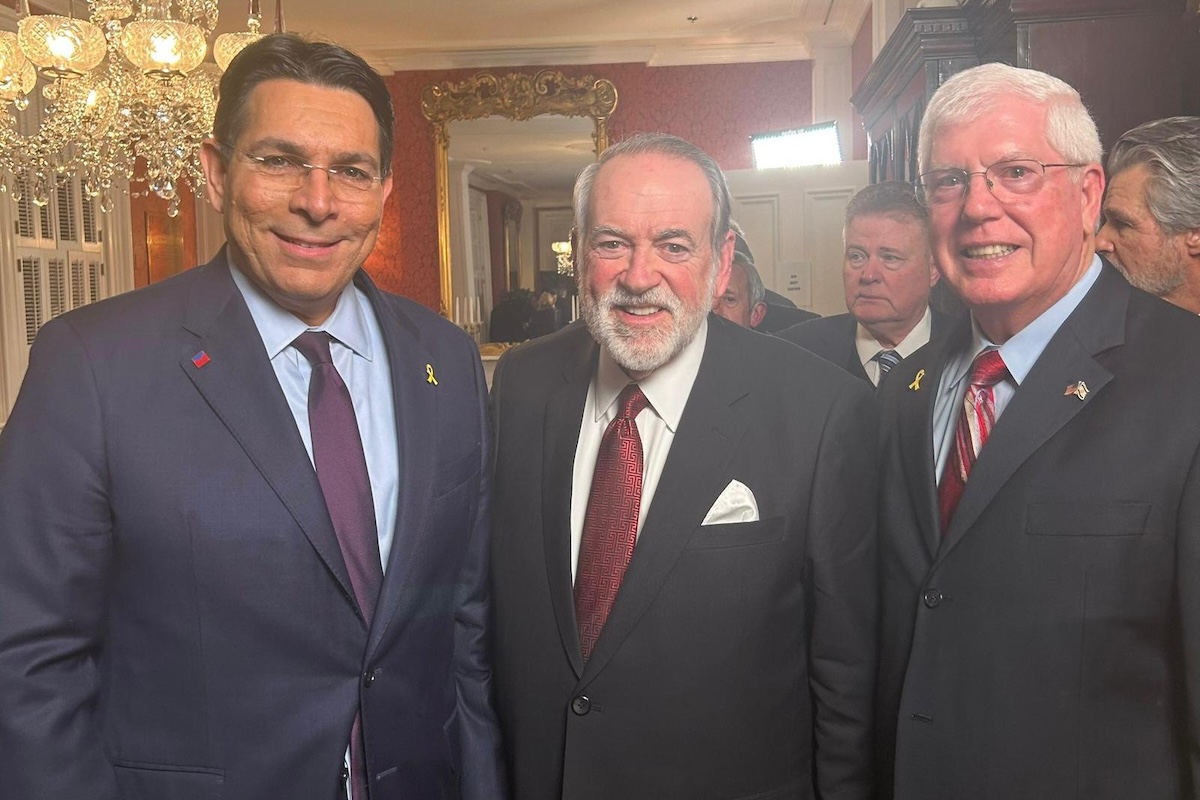
Rosenberg: Absolutely. I think you're already showing one of the blessings of having an Evangelical ambassador. I know you're still an ambassador-designate at this point, but we're trusting that it's going to go the full course. One of the blessings is that you've got an eye on the relationship between Evangelicals, the leadership of Israel and the people of Israel, because you are an Evangelical. It's not like a constituency group. It's who you are, among other elements.
Are there some takeaways? Is it accurate that it was either off the record or on deep background? I know people came out and were able to say that they had the meeting and they were able to share some observations. So, maybe you could share some observations with us, of the flavor of it.
Huckabee: Well, I think it's fair now that the meeting has happened, without going into every detail, there were some very special moments. Dr. Robert Jeffress, the pastor of First Baptist Church Dallas, who also is known for his program “Pathway to Victory” on radio and television, and a wonderful supporter of Israel and leader, got things off at the start by simply asking the Prime Minister very candidly: “Does the release of hundreds, perhaps thousands of Palestinian prisoners create a problem for Israel in order to get the hostages back?”
I think it's a question that everybody felt deeply about – is this an incentive now for future hostage-taking?
The Prime Minister was very thoughtful about it, and made it very clear. The blunt answer was, yes, there is a risk. And we know there's a risk, but we also know we have to get these hostages out and we take this one step at a time. We're not oblivious to the risk involved in releasing Palestinian prisoners but we also recognize that these families have waited over 480 days to know the disposition of their loved ones and that that becomes the most urgent thing we must do.
So, I thought his answer was one of utter candor, and I think it was appreciated. He didn't say, “Oh no, this is fine. It's all wonderful.” Because everybody knows it really isn't. But sometimes, you make hard decisions that aren't perfect, but in the context of trying to save the lives of not just Jewish Israelis, but American citizens, these decisions were made.
Rosenberg: Right. You and I talked about this. Lynn and I had met with Aviva Siegel, interviewed her for my “Inside the Epicenter” podcast with The Joshua Fund, and also on my show on TBN – THE ROSENBERG REPORT – and then she said she would love to meet with you, and you did. Thank you so much. I think it was a phone call or a Zoom call, it was you and several hostage families. [Aviva's] husband, Keith Siegel, 65 years old, is a dual U.S. Israeli citizen, born in the United States, in North Carolina. So, that was really important, I know, to President Trump as well as to you, that we've got to get everybody out [of Gaza], including the Thai workers, the agricultural workers, as well as all the Israelis, but certainly American citizens. So, I want to thank you that you have been playing a behind-the-scenes role, comforting and listening to the Israeli hostage families.
Huckabee: Well, I think it's very important, and a lot of Americans seem to be oblivious to the fact that there were Americans being held hostage. That's one of the things that has been so disappointing to me in the previous administration, that they gave very little attention to the fact that we had American citizens killed, American citizens held hostage. And yet the [Biden-Harris] government was putting more pressure on Israel to have a ceasefire than on Hamas to give up those hostages and to do it immediately.
So, what we have seen in the transition to the new administration is a renewed focus and putting on new pressure – and I was so proud of the president for reinstating the maximum pressure on Iran – that's where funding for most of this terrorism has come from – and take their money away from them. Make it so that they can't fund the atrocities that we saw on Oct. 7, 2023, and the atrocities that have been inflicted upon the people of northern Israel by Hezbollah.
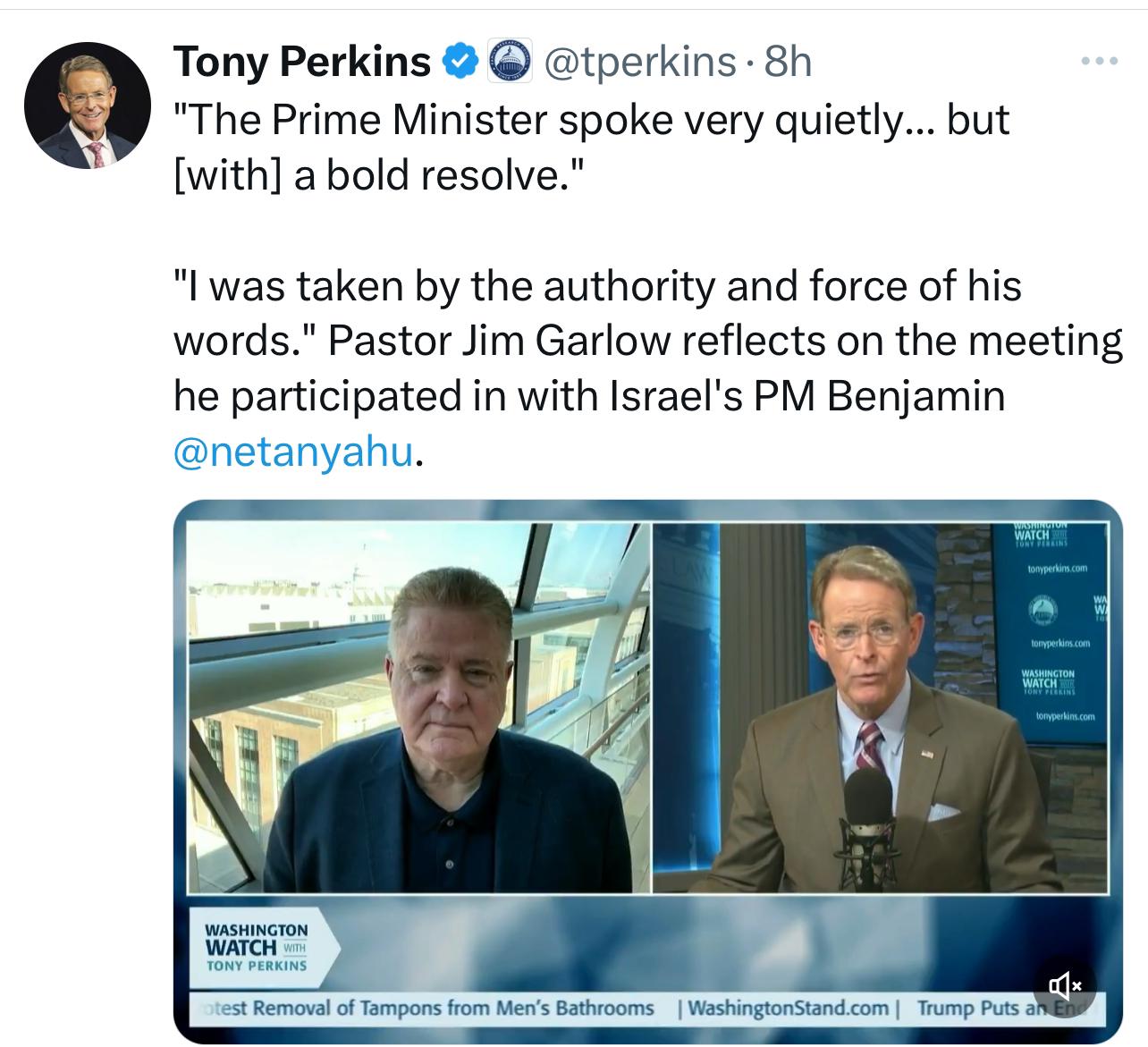
Rosenberg: You said when I interviewed you on THE ROSENBERG REPORT, I believe it was the first or second interview you did after even hearing that you'd gotten this appointment out of the blue, I think you did Fox first and THE ROSENBERG REPORT second.
One of the things you said is, look, the president isn't taking any military options off the table when it comes to Iran, but he wants to bankrupt Iran, not bomb them. If he can avoid bombing them, he wants to be a peacemaker, but he's ready, willing, and able to bankrupt the Iranian regime to get their attention and hope for a diplomatic solution to all this. Did that come up in the meeting with the Evangelicals at all?
Huckabee: It did, because I think everybody understands that unless the Iranians are held in check, none of this changes. It’s like whack-a-mole, you knock one down, and then three more pop up. So, there has to be, at some point, a reckoning with the funding that provides the money that builds the rockets and the tunnels and the training for the Hamas warriors and the Hezbollah and the Houthis. It all comes back to one source, and it's the Iranians.
Rosenberg: In the few minutes we have, do you have a few other observations, a few other questions that various Evangelical leaders asked that you thought were particularly important or insightful?
Huckabee: I think one thing that was very evident through the meeting was making sure that there was recognition that there was no support for this continued, failed policy of a two-state solution, meaning that Israel would give up territory and put those who wish to harm them closer to them and in a position of authority. I think that's one thing that became very evident, that this was not proposed by anyone.
Rosenberg: Can I ask a nuance on that? Because I've been meeting with leaders in the region, but also here in Washington, with various senior Arab officials.
One of the things they are wondering about, especially regarding a Saudi-Israeli normalization agreement – which I'm starting to call the “deal of the millennium,” like last time we were talking about the “deal of the century” but I think this would be the “deal of the millennium,” which is not easy to do after the Oct. 7 war – one of the things they're saying is this: “Is President Trump’s vision of a demilitarized and much more circumscribed and contained Palestinian [entity] – he called it a state back in 2020 when he rolled out the Deal Of The Century plan – some sort of entity that's demilitarized, de-nazified, de-Hamasified, is he still thinking of that? Is that a way to thread the needle between not surrendering Israeli security or sovereignty, letting Israelis have all the settlement blocks, and annexing those into sovereign Israeli territory, but also still leaving a pathway towards some sort of deal with the Saudis?”
Huckabee: I think it would be inappropriate for me to try to speak for what the president might do. He’s already surprised us all with some of the things that he's announced. But clearly, there's got to be consideration for the people, and that is very much a factor that all of us understand. You can't just ignore that there are people, whether we call them Palestinian or Arab. A lot of people don't understand that there are many Palestinians who live within the boundaries of Israel, who live quite successfully and who prosper, and they live in peace. They even are allowed to serve in the Knesset. Most Americans are totally oblivious to the openness that exists for those who wish for there to be coexistence.
But I think when we've seen the celebrating in the streets when Oct. 7, happened, among so many people in Gaza and even in the PA, there's also a recognition that this notion that has been rejected by the Palestinians every single time it's been put on the table, might simply need to be put on the shelf and [we’ll need to] look for new ways. Now, what does that look like? I don't think we know.
I think the honest answer is, is there maybe a resettlement of people in the Sinai, in Egypt, in Jordan, in the UAE and Qatar? I don't know. Those are all options. But the idea that we're going to somehow force Israel to give up its territory, its land, its sovereignty, and put themselves in harm’s way as they were on Oct. 7, I think that's the one thing nobody is saying, “That's a great idea,” because it hasn't proven to work.
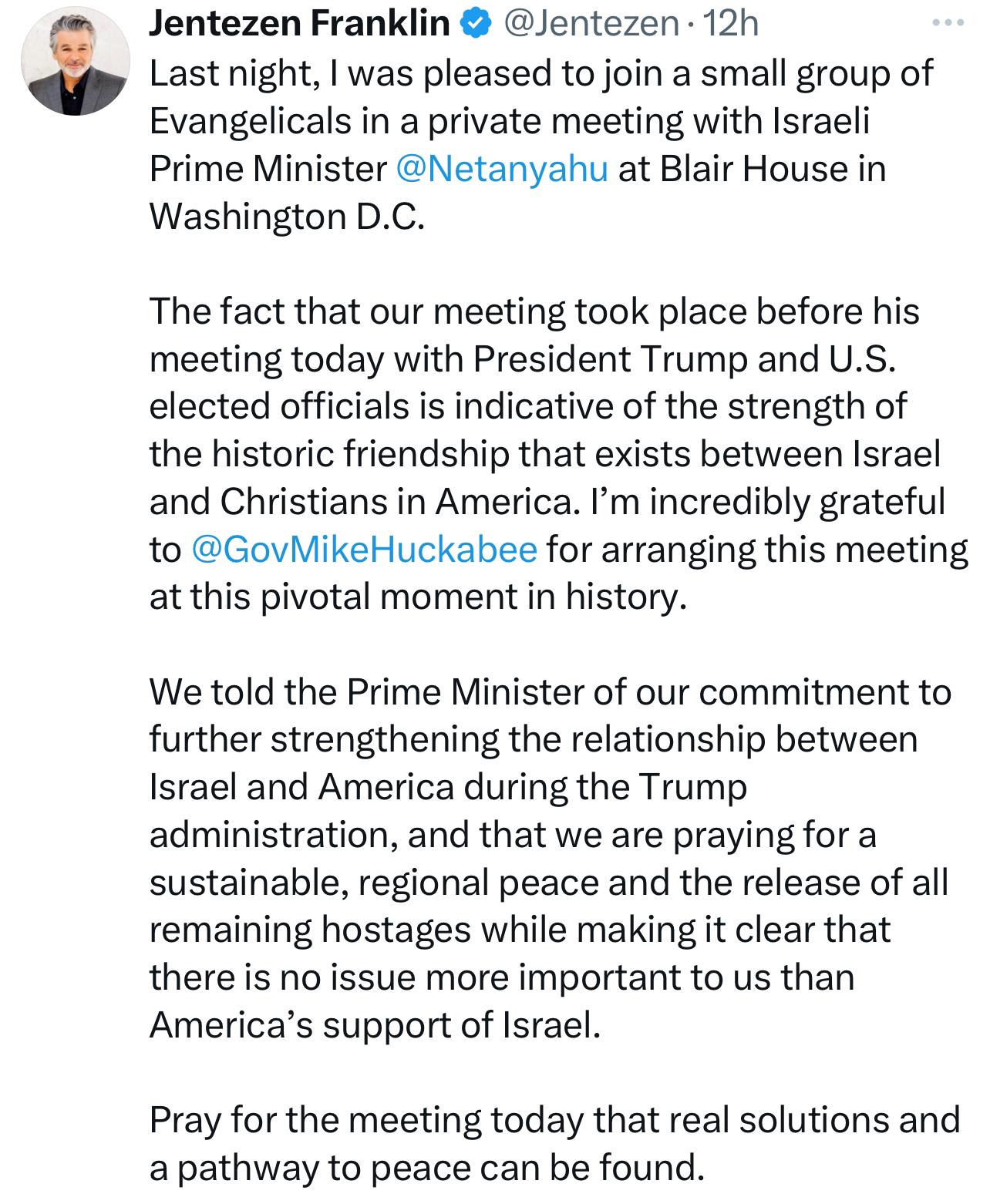
Rosenberg: Is there one more question that somebody asked, or some sort of other takeaway that you have that you think is important for ALL ISRAEL NEWS listeners to understand from inside that meeting?
Huckabee: One thing that might be of interest to your audience is that there was a universal feeling that people are ready to get things back to normal – what's normal in the Middle East? – so that people can once again visit, tours can come, and pilgrims can come and experience the Holy Land. So, there's a real desire to see airline flights renewed, and there'd be enough security so that people feel comfortable about coming back. That is of interest to so many people, because there's a desire to be a part of showing support for Israel and visiting in person, and that was very much a part of what was discussed.
Rosenberg: That's great, I appreciate that. The last thing is, this happened in the Blair House, correct?
Huckabee: It did. Right.
Rosenberg: Roughly how many people were there? How long did you meet? Maybe we’ll wrap up with those, “Who, what, when and where” questions.
Huckabee: Fourteen people who were at the meeting, around the table. It included the Israeli ambassador to the US [Yechiel Leiter], and it included [Israeli Minister of Strategic Affairs] Ron Dermer, and a couple of other folks from the Israeli government. It was a very small group that sat at the table with the Prime Minister. It lasted for about 90 minutes.
Again, it was a very thoughtful and, I thought, open discussion and I thought the Prime Minister was extremely candid. It was not like the kind of meeting where he felt he needed to be guarded and overly careful. As you know, you’ve known him a long time, as I have, he's a man that tends to very much speak his thoughts. The Prime Minister is very clear and he's not a person that you have to say, “What did he say?” I thought that his sincerity and his sense of comfort with the people in that room was refreshing.
Rosenberg: He's invested 35 or so years in these relationships. I've known him for 25, and you've known him for well longer than that. I think it's important, and I really appreciate that he prioritized it, in a week that's so full for him, and that you prioritized an opportunity to sit with some good friends and some people that he knows will be praying, and are praying for him, and need to hear so that they can share with others his heart with the Evangelical community. Mike Huckabee, thank you for sharing about this with all of us at ALL ISRAEL NEWS.
Huckabee: It's always a pleasure, Joel, and thank you for your role in disseminating wonderful, positive and factual information about what's taking place in the Middle East.

Joel C. Rosenberg is the editor-in-chief of ALL ISRAEL NEWS and ALL ARAB NEWS and the President and CEO of Near East Media. A New York Times best-selling author, Middle East analyst, and Evangelical leader, he lives in Jerusalem with his wife and sons.
You might also like to read this:



